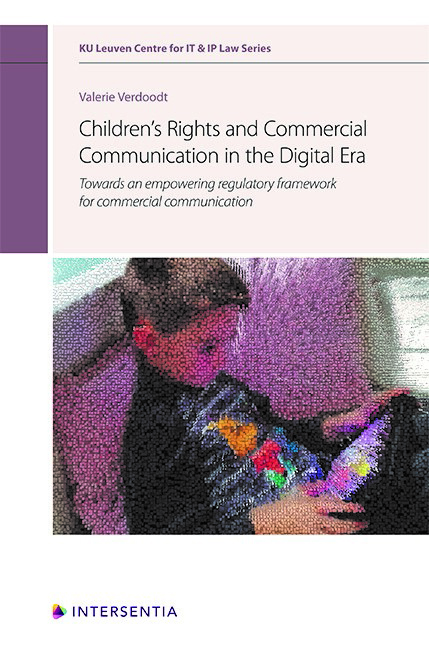 Children's Rights and Commercial Communication in the Digital Era
Children's Rights and Commercial Communication in the Digital Era Published online by Cambridge University Press: 23 July 2020
ARIs AND THE BROADER LEGAL FRAMEWORK. The first chapter of this final part of the research explored the interplay between ARIs and the broader legal framework. It was concluded that the advertising industry has important responsibilities to respect and promote children’s rights throughout their advertising and marketing practices. Relatedly, the EU legislative framework indirectly encourages them to develop advertising self-regulation, in light of children’s rights. In this regard, several requirements for the structuring and development of advertising ARIs were distilled. First, it was concluded that children’s procedural rights require that an ARI adheres to a number of procedural safeguards, such as impartiality, independence and transparency. Second, a number of general benchmarks at the EU level, which provide input for the best practices were analysed. Finally, the analysis explored how the advertising industry has developed its own benchmarks for advertising self-regulation.
COMPARATIVE ASSESSMENT. The second chapter of this part of the research examined three national ARIs in the area of commercial communication. On the basis of this comparison and the requirements and benchmarks found in the first chapter, a number of best practices for ARIs in the area of commercial communication can be extracted:
1. Proactive monitoring of advertisements online
A first best practice relates to the specific characteristics of commercial communication. More specifically, as illustrated, consumers (and especially children) have difficulties recognising the sophisticated and immersive advertising techniques that are being used in the digital environment. It was argued that this could be a reason for the low amount of consumer complaints concerning new advertising techniques and children. Accordingly, from the analysis of the monitoring and oversight mechanisms of the three ARIs, it was concluded that some form of proactive monitoring of advertisements online by the alternative regulatory body, which has the competence to launch investigations, is to be preferred over a purely complaint-based system.
2. Formal cooperation between alternative regulatory bodies and governmental Agencies
A second best practice relates to the most frequent criticisms of a purely self-regulatory approach in academic scholarship, namely the lack of effective enforcement. From the comparative study, it was concluded that having some form of government involvement is recommended to obtain stronger enforcement.
To save this book to your Kindle, first ensure [email protected] is added to your Approved Personal Document E-mail List under your Personal Document Settings on the Manage Your Content and Devices page of your Amazon account. Then enter the ‘name’ part of your Kindle email address below. Find out more about saving to your Kindle.
Note you can select to save to either the @free.kindle.com or @kindle.com variations. ‘@free.kindle.com’ emails are free but can only be saved to your device when it is connected to wi-fi. ‘@kindle.com’ emails can be delivered even when you are not connected to wi-fi, but note that service fees apply.
Find out more about the Kindle Personal Document Service.
To save content items to your account, please confirm that you agree to abide by our usage policies. If this is the first time you use this feature, you will be asked to authorise Cambridge Core to connect with your account. Find out more about saving content to Dropbox.
To save content items to your account, please confirm that you agree to abide by our usage policies. If this is the first time you use this feature, you will be asked to authorise Cambridge Core to connect with your account. Find out more about saving content to Google Drive.